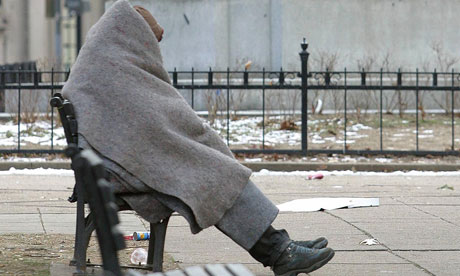Maybe you think you’re safe, because you’re not out on the street. Think again:The most shocking thing I learned from my research on the fate of the working poor in the recession was the extent to which poverty has indeed been criminalised in America.

Photograph: Robyn Beck/EPAPerhaps the constant suspicions of drug use and theft that I encountered in low-wage workplaces should have alerted me to the fact that, when you leave the relative safety of the middle class, you might as well have given up your citizenship and taken residence in a hostile nation.
Not just poverty, but generosity, has been criminalized.The viciousness of the official animus toward the indigent can be breathtaking. A few years ago, a group called Food Not Bombs started handing out free vegan food to hungry people in public parks around the nation. A number of cities, led by Las Vegas, passed ordinances forbidding the sharing of food with the indigent in public places, leading to the arrests of several middle-aged white vegans.
And you could be one missed payment away from not only homelessness, but prison:
For the not-yet-homeless, there are two main paths to criminalisation, and one is debt. Anyone can fall into debt, and although we pride ourselves on the abolition of debtors’ prison, in at least one state, Texas, people who can’t pay fines for things like expired inspection stickers may be made to “sit out their tickets” in jail.More commonly, the path to prison begins when one of your creditors has a court summons issued for you, which you fail to honour for one reason or another, such as that your address has changed and you never received it. OK, now you’re in “contempt of the court”.
Or suppose you miss a payment and your car insurance lapses, and then you’re stopped for something like a broken headlight (about $130 for the bulb alone). Now, depending on the state, you may have your car impounded and/or face a steep fine – again, exposing you to a possible court summons. “There’s just no end to it once the cycle starts,” says Robert Solomon of Yale Law School. “It just keeps accelerating.”
The second – and by far the most reliable – way to be criminalised by poverty is to have the wrong colour skin. Indignation runs high when a celebrity professor succumbs to racial profiling, but whole communities are effectively “profiled” for the suspicious combination of being both dark-skinned and poor. Flick a cigarette and you’re “littering”; wear the wrong colour T-shirt and you’re displaying gang allegiance. Just strolling around in a dodgy neighbourhood can mark you as a potential suspect. And don’t get grumpy about it or you could be “resisting arrest”.
The safety net,
or what remains of it,
has been transformed
into a dragnet.
 If you’re white that won’t save you if you get a payment behind and
the wrong judge
summons you.
If you’re white that won’t save you if you get a payment behind and
the wrong judge
summons you.
Today, exactly the same number of Americans – 2.3 million – reside in prison as in public housing. And what public housing remains has become ever more prison-like, with random police sweeps and, in a growing number of cities, proposed drug tests for residents. The safety net, or what remains of it, has been transformed into a dragnet.Which will send them (or you) back to debtor’s prison. Because that’s what it is, in all but name.It is not clear whether economic hard times will finally force us to break the mad cycle of poverty and punishment. With even the official level of poverty increasing – to over 14% in 2010 – some states are beginning to ease up on the criminalisation of poverty, using alternative sentencing methods, shortening probation, and reducing the number of people locked up for technical violations like missing court appointments.
But others, diabolically enough, are tightening the screws: not only increasing the number of “crimes”, but charging prisoners for their room and board, guaranteeing they’ll be released with potentially criminalising levels of debt.
Who benefits by all this?
And poverty, and ignorance, shall swell the rich and grand,Unless you make at least $27 million a year or have hundreds of millions in assets you are not in the top 0.1% of the population that owns and controls most of everything, and you are not the rich and grand. You are much more likely to to end up in debtor’s prison than to reach that 0.1%. Welcome to the 1840s!
So, rally round the rulers with the gentle iron hand,
Of the fine old English Tory days;
Hail to the coming time!
—Charles Dickens, The Fine Old English Gentleman, 1841
Is that what you want?
If not, we know what to do. End the War on Drugs. Start by ending marijuana prohibition.
And right here in Lowndes County, we don’t need a private prison recycling people through debt back to enrich their executives and shareholders. Spend that tax money on rehabilitation and education. And feed the hungry.
-jsq
Short Link: